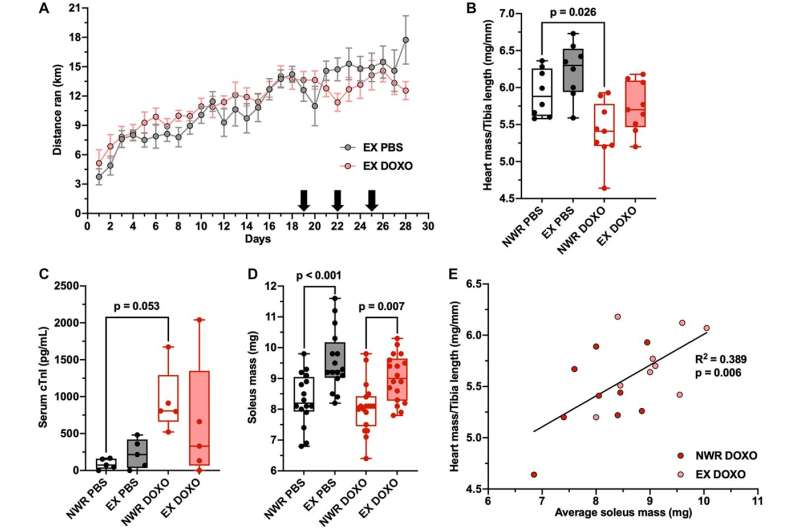Home » Health News »
Enhancing doxorubicin anti-tumor efficacy and ameliorating cardiotoxicity with aerobic exercise

Oncotarget has published a report that aerobic exercise is receiving increased recognition in oncology for its multiple purported benefits.
Exercise is known to induce physiologic adaptations that improve patient quality-of-life parameters as well as all-cause mortality. However, the exercise prescription required to induce these beneficial tumor-related outcomes remains unclear.
This study characterized the aerobic adaptations to voluntary wheel running in normal tissues and the tumor microenvironment. However, intratumoral hypoxiaand global metabolism were altered in the tumors of exercising hosts relative to non-wheel running controls. Doxorubicin chemotherapy also was found to be more efficacious at delaying tumor growth with adjuvant aerobic exercise.
Dr. Zachary R. Wakefield from The University of Florida says that “cancer presents a major public health concern both in the United States and worldwide.”
In females, breast cancer is the most commonly diagnosed malignancy and is responsible for the second most deaths across all cancer types.
Triple-negative breast cancer, characterized by the lack of expression of estrogen receptor, progesterone receptor, and human epidermal growth factor 2, is a particularly aggressive subtype with poor outcomes. Aerobic exercise is intriguing as a potential adjuvant therapy for breast cancer. When implemented either during or after treatment, exercise has been shown to result in reduced adverse events, and to improve quality-of-life and aerobic respiratory fitness in cancer patients.
In addition, clinical trials have shown that exercise can decrease risk of breast cancer recurrence. Consequently, exercise recommendations are being adopted by major national and international cancer organizations. Still, the therapeutic potential of including exercise in clinical cancer management is far from fully realized. Emerging clinical data suggest that in addition to the known physical and psychological benefits, aerobic exercise may also improve cancer treatment efficacy and limit associated toxicity.
This may be of particular relevance for breast cancer survivors in whom cardiovascular disease is increasingly prevalent. Various chemotherapies are known to be cardiotoxic and doxorubicin, a highly prescribed chemotherapeutic agent for the treatment of breast cancer, has cumulative and dose-dependent cardiotoxic effects. Despite generally positive findings in regard to exercise and cancer outcomes, it remains unclear how to properly prescribe exercise. Here, the authors employed voluntary wheel running in orthotopic, syngeneic models of breast cancer in aged mice.
Source: Read Full Article



